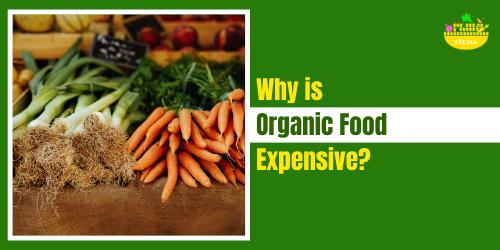Why is Organic Food Expensive?

To enhance the environmental quality for our future generations, more and more farmers are emphasizing producing organic foods.
The production of organic food is free of pesticides, artificial growth hormones, and other harmful chemicals.
This is the reason that nowadays, a majority of the population is moving from conventional to organic food even after knowing that they are expensive.
Yes!! Organic foods are expensive when compared to their conventional food products, but if we go on thinking after a few years, then perhaps we will understand that organic food is not that expensive, as they save your extra bucks which may be spent on diseases.
So, what is the driving force behind such raised prices of organic foods?
Let’s find out.
- Expensive Fertilizers
Do you want sewage sludge and chemical mixed fertilizers on your plate?
Obviously, no one wants this.
but these things are used in conventional farming as they are cheap and can easily be transported but in organic farming, to keep the fruits and veggies natural, farmers use animal manure and compost which is quite expensive in transportation and shipping but also good for your health.
- Crop Rotation
To keep the soil healthy, to maintain the soil quality, and to prevent weed growth by avoiding harmful weed-killing chemicals, organic farmers use the crop rotation method to maintain the quality of Nitrogen in the soil. Organic farmers grow “cover crops” that benefit the next lot of crops. But it reduces the frequency of growing profitable crops and farmers are not able to produce more crops on that site. These things affect the supply and increase the prices of organic foods. Whereas in conventional farming, farmers use fertilizers which reduces the nitrogen amount in the soil and leads to nutritional deficiency in the soil and foods produced there lack nutritional values.
- 0% Chemicals require 100% Labour
Conventional farming requires less labor as more than half of the work is done by chemicals, artificial pesticides, etc. which results in overall cost reduction. Whereas organic farming requires a 100% workforce for tasks like taking care of pesticide contamination, weed removal, polluted water clean up, etc. These tasks add extra cost to production, which in turn increases organic fruits and vegetables’ prices.
- Unbalanced Demand-Supply
A great number of the population is moving towards organic products, and in organic farming, due to zero utilization of chemicals, organic farm production is very less. So, the supply of organic products can’t meet the demand-supply ratio, and its prices are going higher. In the case of conventional farming, they easily meet the demand as they produce in huge quantities by using pesticides and crop rotation in the same place again and again.
- low Production/Growth
As organic fruits and vegetables are free from chemicals, pesticides, and growth hormones, they take more time to reach the ripening stage, so due to this time-taking procedure, their production is slow and requires lots of attention, and that’s why their cost increases.
Thoughts
Investment in Organic food is no doubt a costlier one but it’s a wise investment, both for your health and the environment. We all know that cheap things are an expensive entity in the end, then why suffer?
At Freshji, you will get organic fruits and vegetables at the most affordable prices. Being the biggest wholesaler of fresh fruits and vegetables in Kolkata, freshji serves the best to its customers with a tag of NPOP certified organic farm in Kolkata.
For any kind of parties, corporate houses, restaurants, and hotels you can contact us for bulk supplies of organic food in Kolkata.


Comments